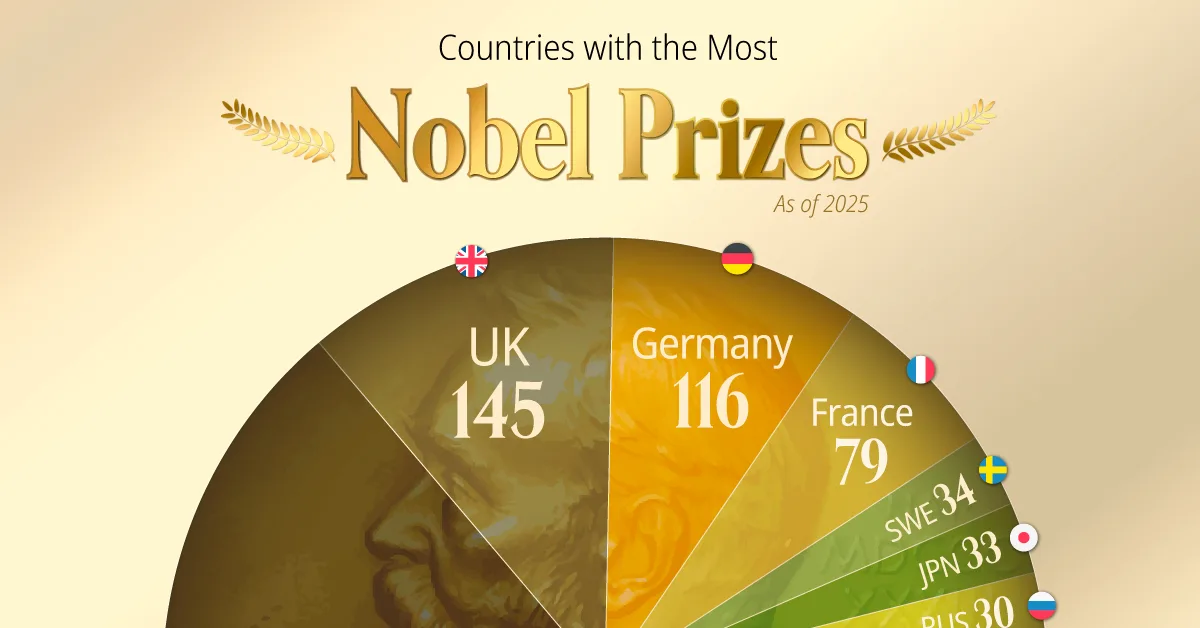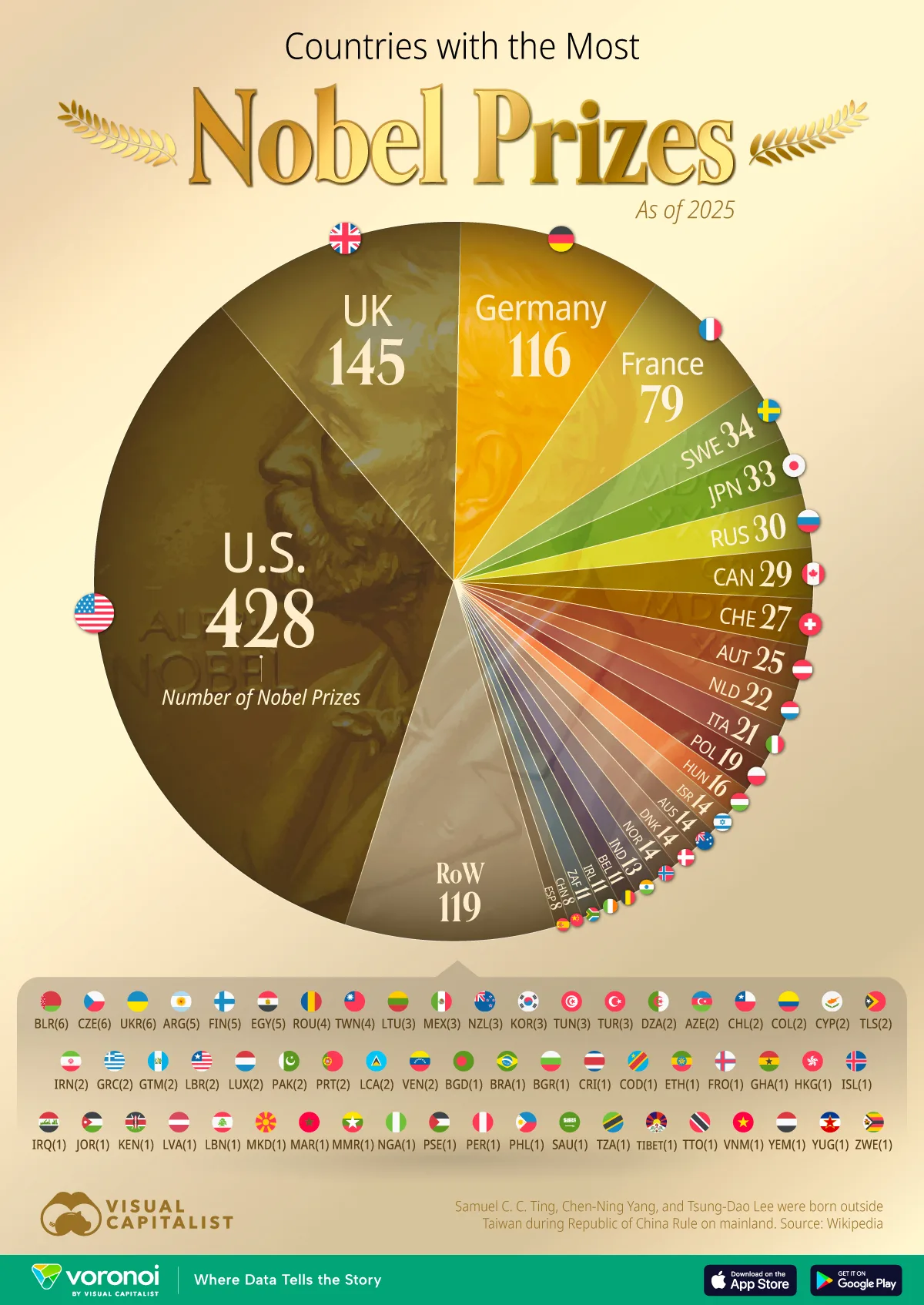Ranked: Countries With the Most Nobel Prizes
See visuals like this from many other data creators on our Voronoi app. Download it for free on iOS or Android and discover incredible data-driven charts from a variety of trusted sources.
Key Takeaways
- The Nobel Prize is an international award for outstanding achievements in science, literature, and peace, given annually since 1901.
- Among the long list of U.S. laureates are Martin Luther King Jr. (for his fight against racial segregation and injustice) and Ernest Hemingway (for his impactful work in literature).
The Nobel Prize is one of the world’s most prestigious honors, recognizing people who have made remarkable contributions to humanity. Established in 1901, the award covers several categories including World Peace, Chemistry, Medicine, and Economics.
In this graphic, we’ve ranked the countries with the most Nobel Prizes as of 2025, identifying the hotspots of innovation, science, and social progress.
Data & Discussion
The data for this visualization was sourced by Wikipedia’s List of Nobel laureates by country. It tracks the total number of Nobel Prizes awarded by nationality.
| Country | Number of Nobel Prizes Won |
|---|---|
 U.S. U.S. |
428 |
 UK UK |
145 |
 Germany Germany |
116 |
 France France |
79 |
 Sweden Sweden |
34 |
 Japan Japan |
33 |
 Russia Russia |
30 |
 Canada Canada |
29 |
 Switzerland Switzerland |
27 |
 Austria Austria |
25 |
 Netherlands Netherlands |
22 |
 Italy Italy |
21 |
 Poland Poland |
19 |
 Hungary Hungary |
16 |
 Israel Israel |
14 |
 Australia Australia |
14 |
 Denmark Denmark |
14 |
 Norway Norway |
14 |
 India India |
13 |
 Belgium Belgium |
11 |
 Ireland Ireland |
11 |
 South Africa South Africa |
11 |
 China China |
8 |
 Spain Spain |
8 |
| Rest of World (59 countries) |
119 |
34% of Nobel Prizes Have Gone to Americans
Americans lead by a wide margin, with 428 Nobel Prizes in total.
Prominent figures such as Martin Luther King Jr. and Ernest Hemingway represent the U.S. across peace and literature, while countless scientists have shaped modern medicine and physics. Examples include:
- Linus Pauling (1954, Chemistry): Honored for discovering how atoms form chemical bonds. He later won a Nobel Peace Prize in 1962 for his activism efforts.
- Robert F. Curl Jr. (1996, Chemistry): Co-discovered fuellerenes, carbon molecules that open up new frontiers in nanotechnology and materials science
- Robert J. Lefkowitz (2012, Chemistry): Discovered how cells sense and respond to signals through G-protein-coupled receptors, paving the way for drugs that target diseases like heart disease and asthma.
The Global Reach of the Nobel Legacy
Although the top 10 countries account for a vast majority of prize winners, laureates have emerged from dozens of other nations.
Here are several examples of Nobel Prize winners from around the world:
 Iceland: Halldór Kiljan Laxness won the 1955 Nobel Prize in Literature for his vivid, socially conscious novels that captured the spirit and struggles of Icelandic life.
Iceland: Halldór Kiljan Laxness won the 1955 Nobel Prize in Literature for his vivid, socially conscious novels that captured the spirit and struggles of Icelandic life. Philippines: Maria Ressa won the 2021 Nobel Peace Prize for her fight for press freedom and efforts to safeguard democracy through independent journalism in the Philippines.
Philippines: Maria Ressa won the 2021 Nobel Peace Prize for her fight for press freedom and efforts to safeguard democracy through independent journalism in the Philippines. China: Tu Youyou won the 2015 Nobel Prize in Physiology or Medicine for discovering artemisinin, a groundbreaking malaria treatment that has saved millions of lives worldwide.
China: Tu Youyou won the 2015 Nobel Prize in Physiology or Medicine for discovering artemisinin, a groundbreaking malaria treatment that has saved millions of lives worldwide. Ethiopia: Abiy Ahmed Ali (Prime Minister of Ethiopia) won the 2019 Nobel Peace Prize “for his efforts to achieve peace and international cooperation, and in particular for his decisive initiative to resolve the border conflict with neighboring Eritrea.”
Ethiopia: Abiy Ahmed Ali (Prime Minister of Ethiopia) won the 2019 Nobel Peace Prize “for his efforts to achieve peace and international cooperation, and in particular for his decisive initiative to resolve the border conflict with neighboring Eritrea.”
Learn More on the Voronoi App 
If you enjoyed today’s post, check out Countries With the Best Reputations in 2025 on Voronoi, the new app from Visual Capitalist.
















